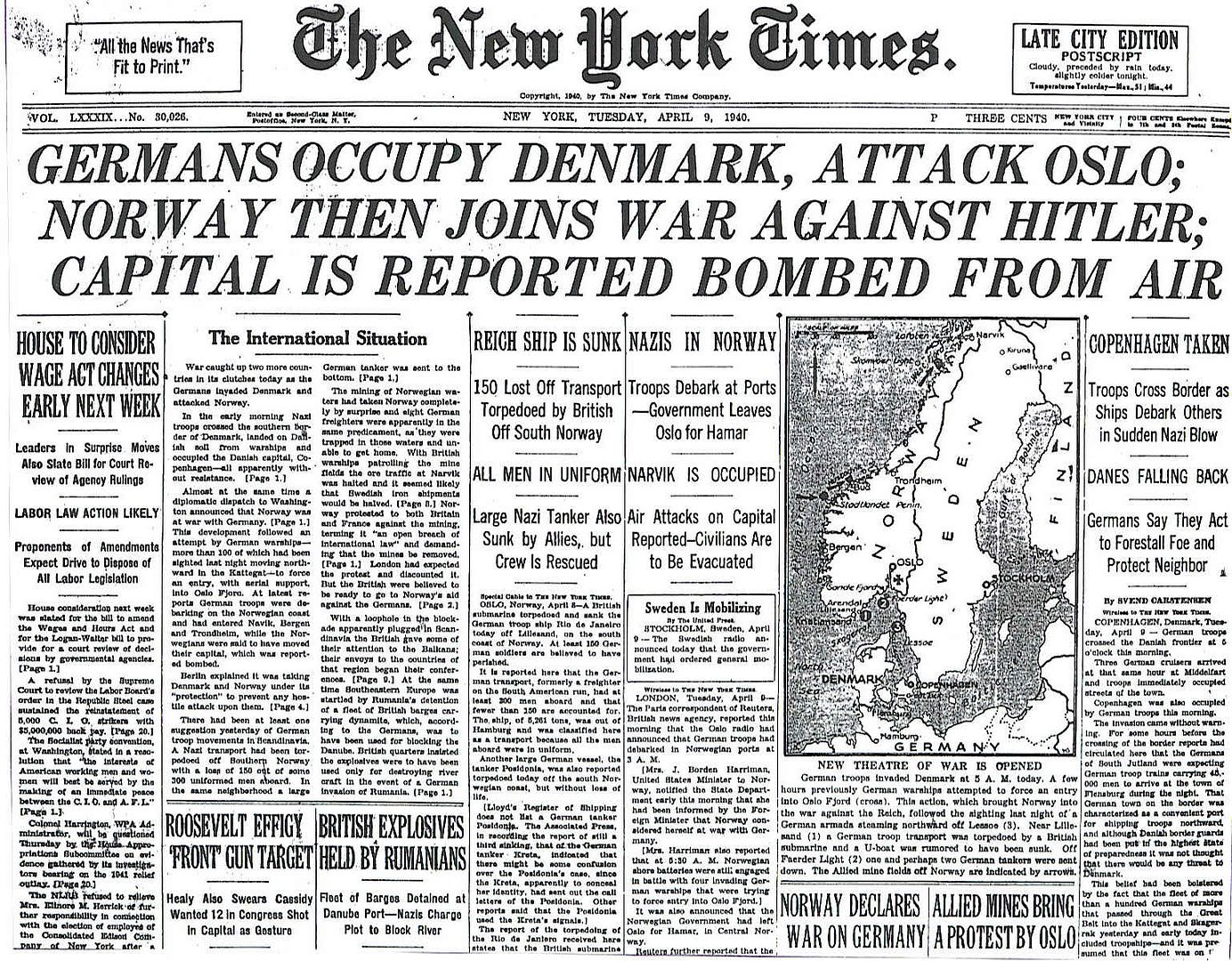
Posted on 04/09/2010 4:35:31 AM PDT by Homer_J_Simpson

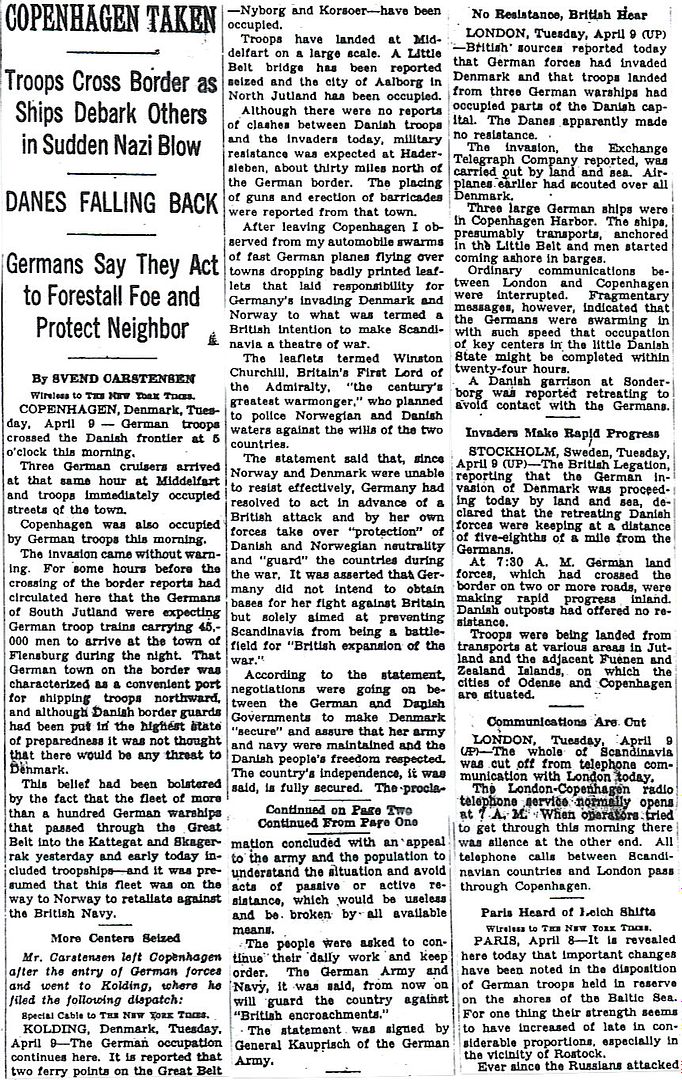
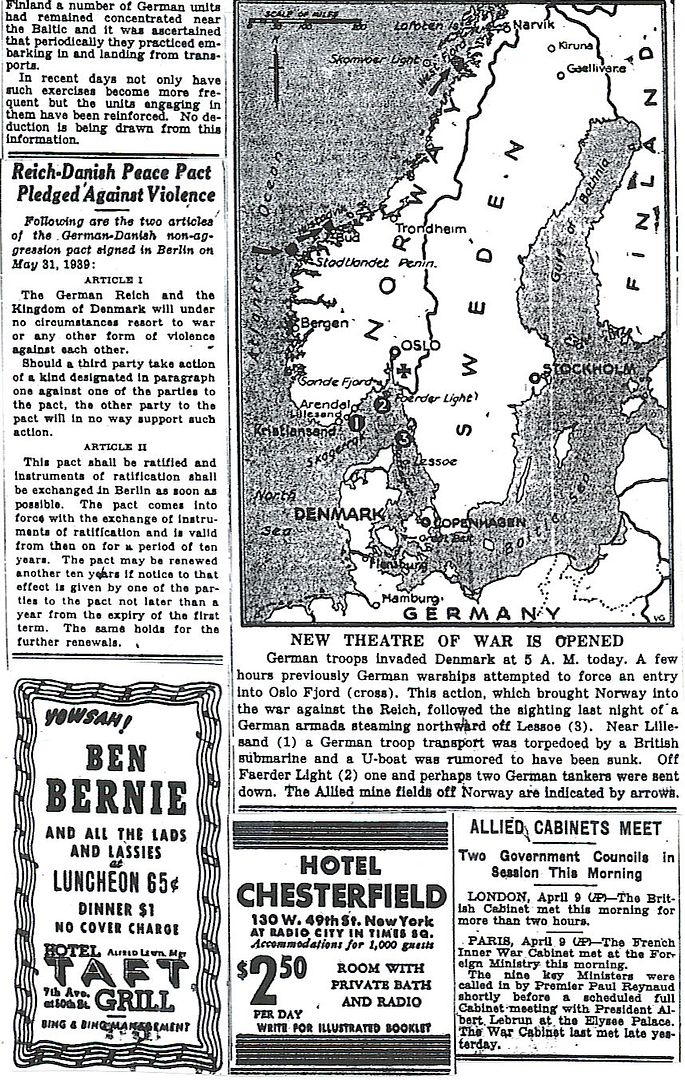
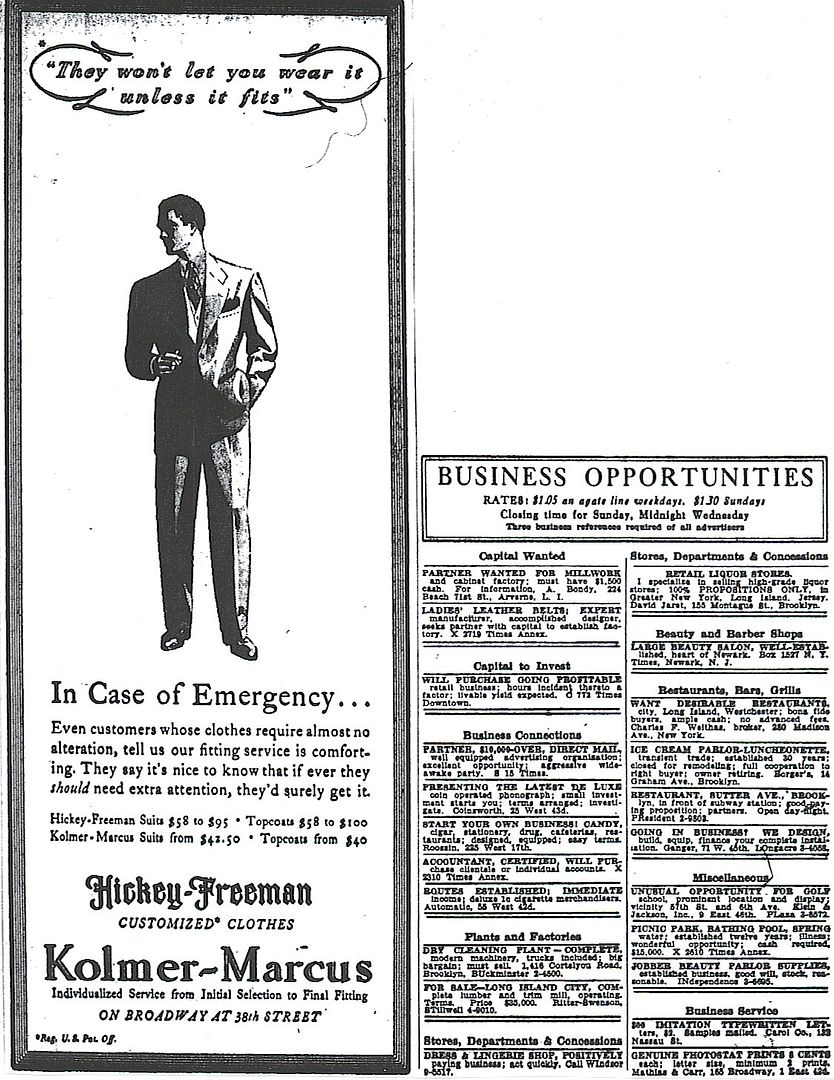
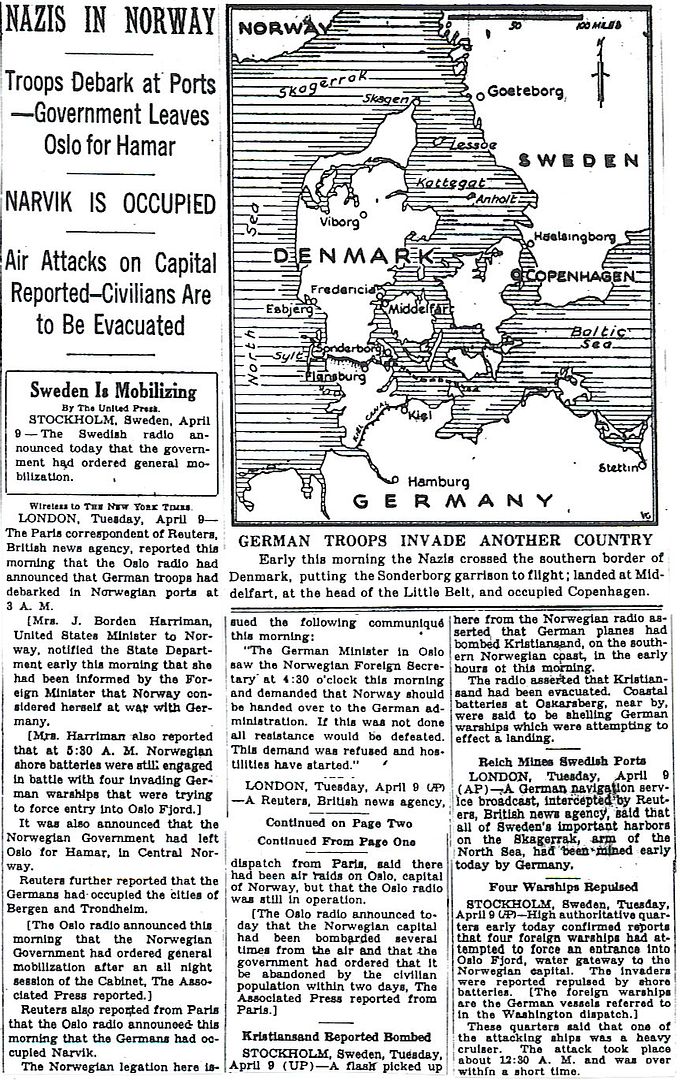
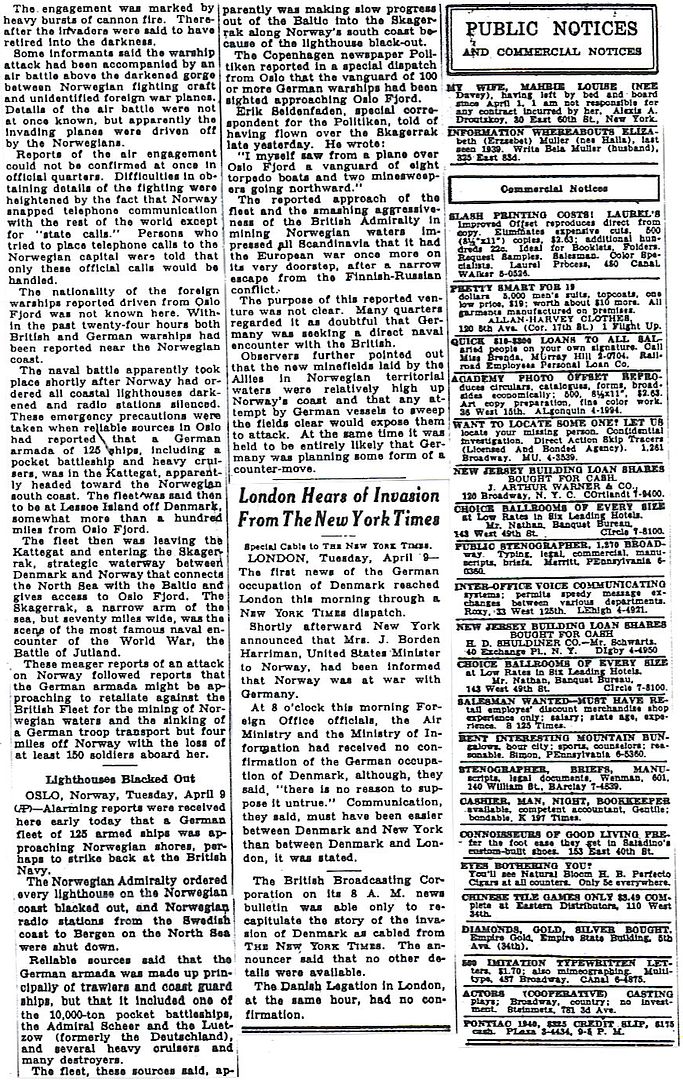

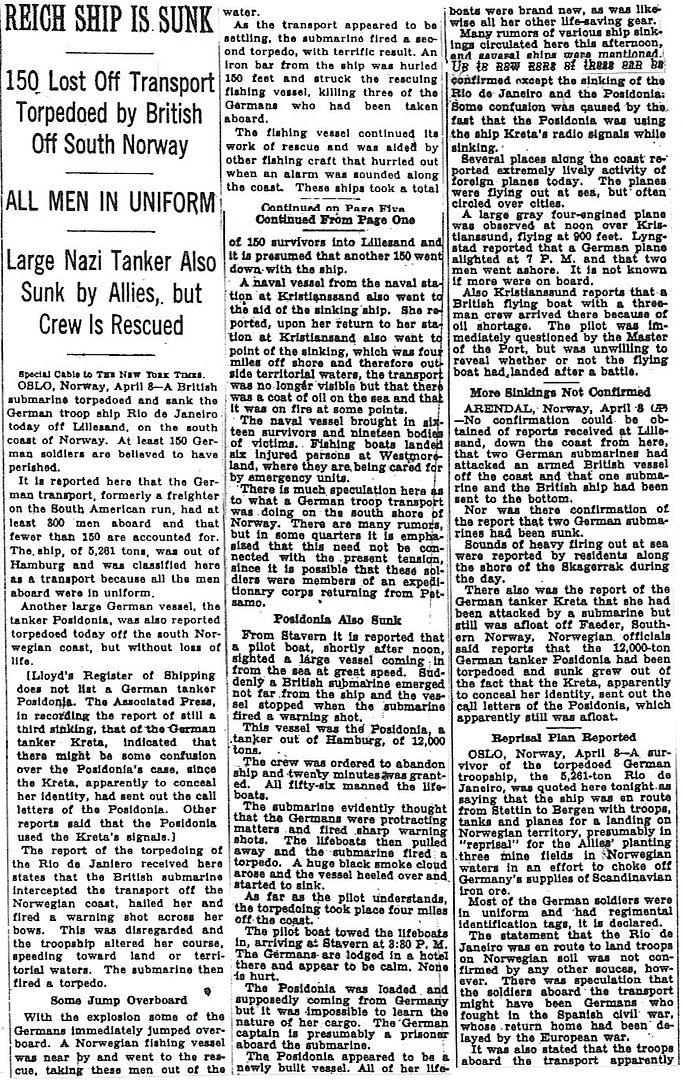
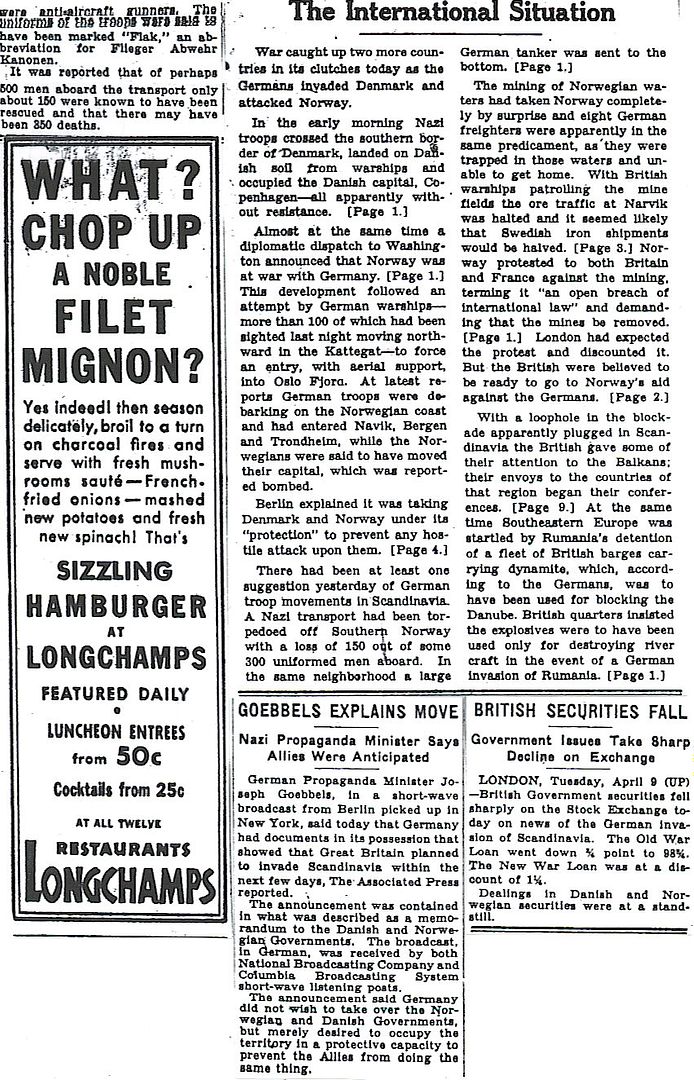
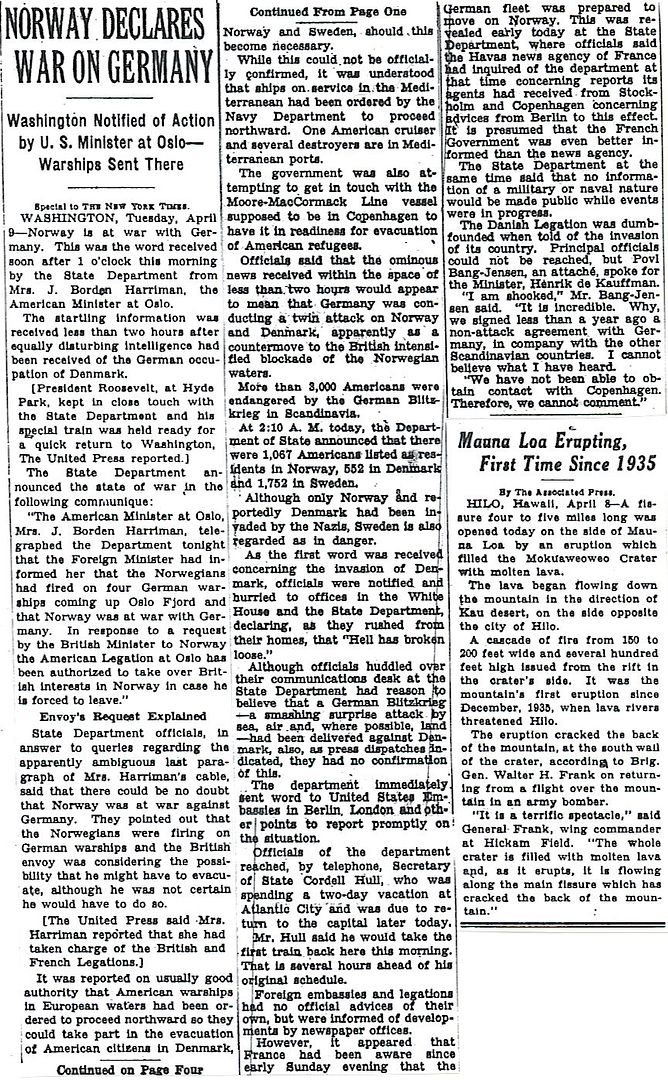
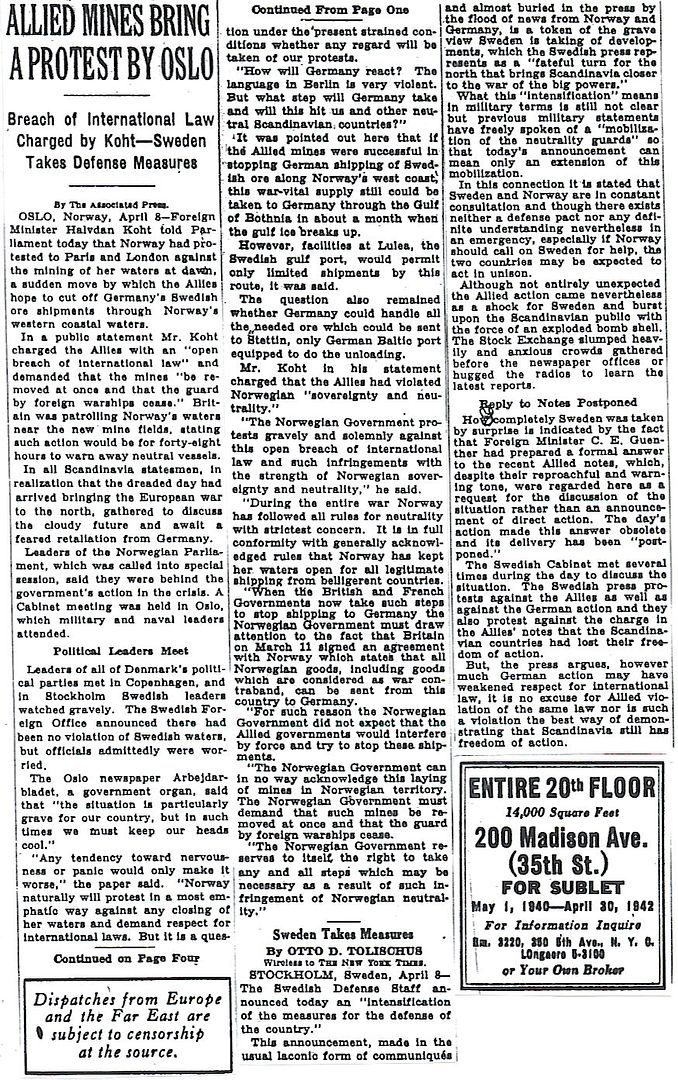
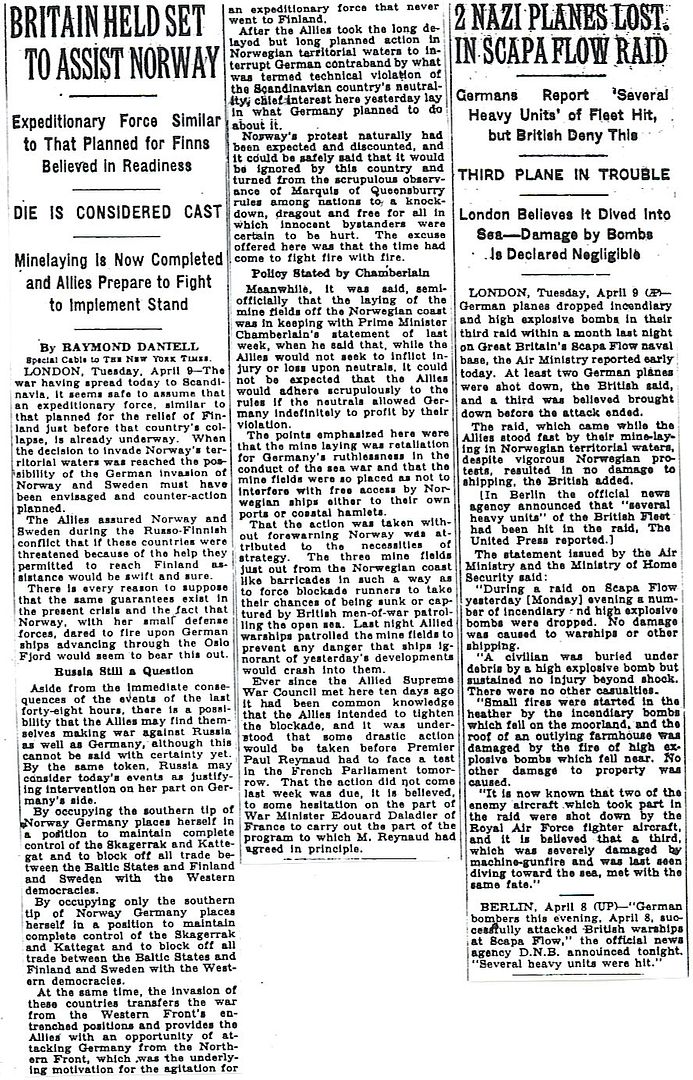
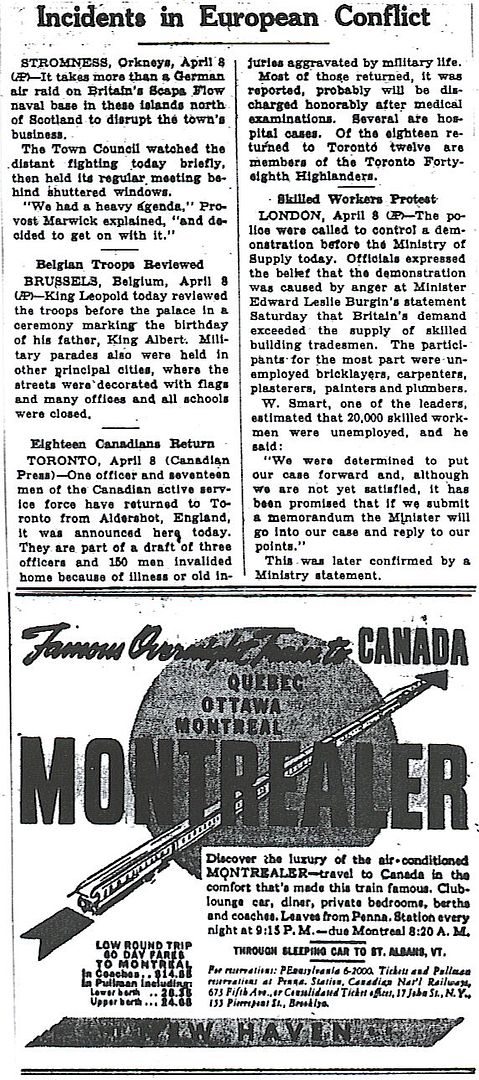
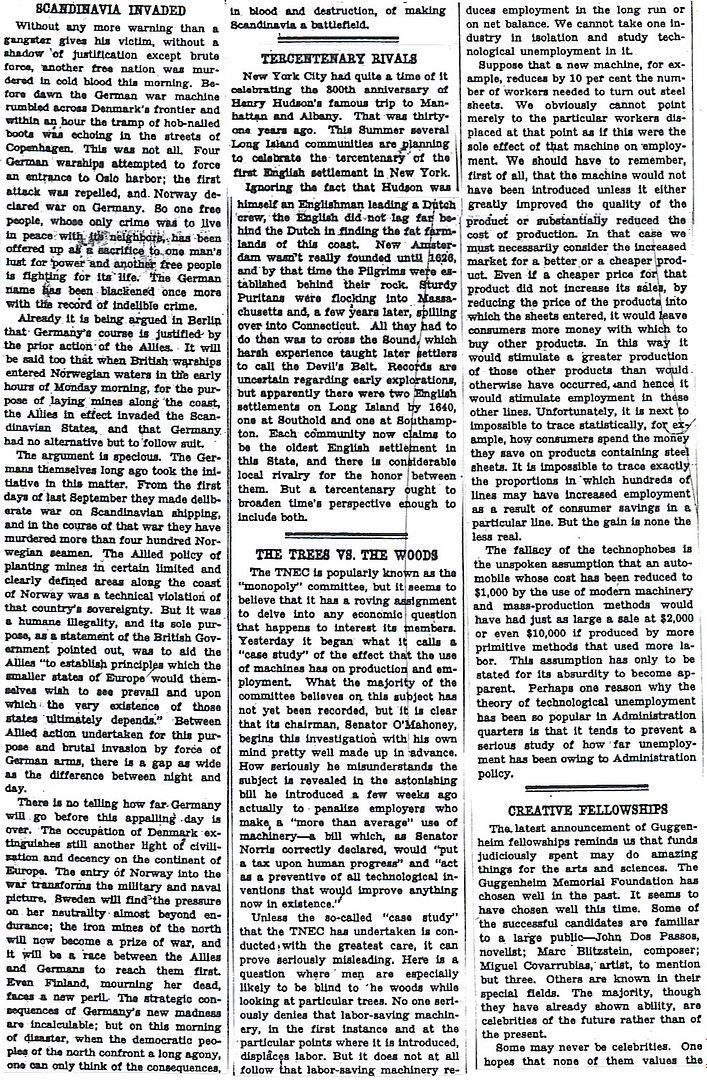
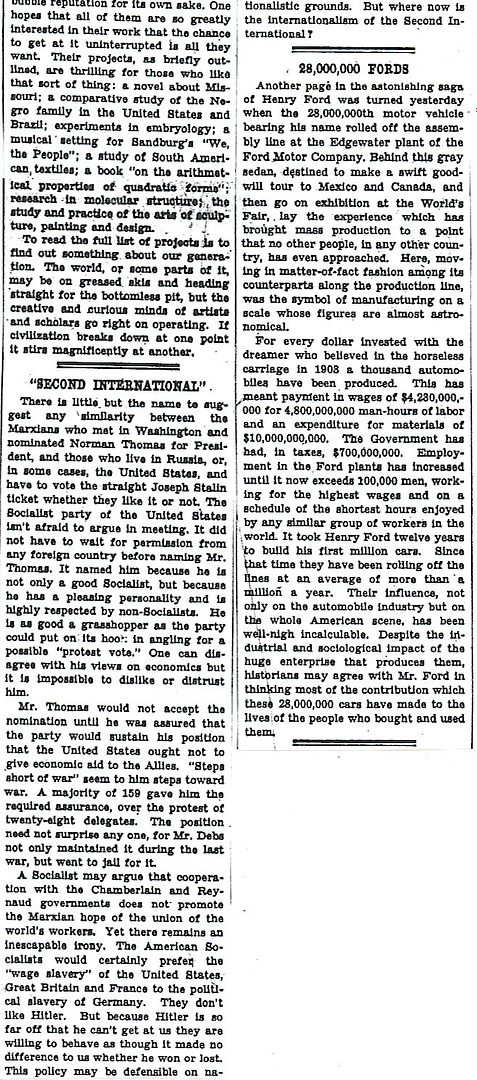
In April 1940, Neville Chamberlain announced the "Hitler had missed the bus." The prime minister's confidence reflected a hope that the Allied blockade was strangling Germany's economy and winning the war without the terrible blood-letting of World War I. As Chamberlain wrote to his sister that month, "The accumulation of evidence that an attack [in the west] is imminent is formidable...and yet I cannot convince myself that it is coming." But Chamberlain had missed all of Hitler's signs. The leader of the Third Reich would risk all on a great offensive, and he had tanks, not busses. - A War to be Won, Williamson Murray and Allan R. Millett p. 63
This latest failure on Chamberlain's part would be the last straw for parliament. It will not be too much longer till the First Lord of the Admiralty will be asked to step up into the roll.
Continuing the debate... ;-)
I still argue Hitler did not need that Swedish-Kiruna iron ore shipped from Narvik, Norway. Certainly not in April 1940, just as the ice was melting in Sweden's Baltic ports, such as Lulea.
In 1939, Germany received the vast majority of its Swedish ore not through Narvik, but through Lulea, on the Baltic.
So seems to me a minor investment in upgrading Lulea's facilities could have eliminated the need for Narvik altogether.
Certainly much cheaper than the cost of invading Norway.
Yes, Britain had last-minute plans to "violate Norway's neutrality." But Sweden's?
No.
The Swedes would fight to protect their independence.
Point is, as long as Hitler remained on good terms with the Swedes, he was going to receive all the high-grade ore from Kiruna he wanted.
Narvik was not necessary.
So why invade Norway?

The German Naval Group Five entered the Oslofjort at midnight on the 8th-9th, led by the brand-new heavy cruiser Blücher, sister-ship of the Hipper. four hours into the narrow waterway, the cruiser reached the most constricted point, still some eighteen miles south of the city. With true German thoroughness, she carried not only troops but also an embryo occupation-government complete with officials, filing cabinets, stationery and spare uniforms. At that moment, 4:20 a.m., the redoubtable Coastal Artillery blasted her at optimum range from both side of the channel. Two hours later, helped on her way to the bottom by salvoes of torpedoes from the shore, the Blücher sank with severe losses.
The Atlantic Campaign, Dan Van der Vat, p. 154.
I believe the entire Gestapo contingent for Oslo was on the BLUCHER and went down with her. The CO of the Gestapo did.
BLUCHER was a HIPPER class heavy cruiser, sister ship to HIPPER and PRINZ EUGEN [8X8” main guns].
In layout they looked exactly like miniature versions of BISMARCK/ TIRPITZ] [which may explain why HOOD and PRINCE OF WALES concentrated fire on PRINZ EUGEN for some two minutes at the opening of the battle of the Denmark Strait, when EUGEN was leading BISMARCK].
Tough, well built ships [although the engines could be a problem, especially on HIPPER]. PRINZ EUGEN survived TWO A-bombs at Bikini Atoll.
The link to start the tour is towards the bottom of the page.

*Neigh*
If I recall correctly, about 1/4 of all Gestapo strength in [Western?] Europe was in Norway. Read it somewhere.
Forester wrote a nice little nvel on the BISMARCK chase.
He did; it was called “Sink the Bismarck!” I read it in 8th grade. The British 1961 movie of the same title was based (loosely) on Forester’s book. The naval combat scenes are some of the best. More on that in 13 months.
The Hipper class were tough ships, but Hipper was troubled through her career by balky engines. Prinz Eugen sailed with Bismarck, survived the “Channel Dash” with Scharnhorst & Gneisenau, and finished the war by providing fire support for German soldiers fighting in East Prussia and Latvia. She also served as a convoy escort as the Germans evacuated an estimated 2,000,000 civilians from East Prussia and the Baltic ahead of the Red Army.
Even though there was active resistance to the Germans in Norway, there were also collaborators. The Germans were able to recruit enough volunteers from the Scandinavian countries,including Norway, to fit out the 5th SS Panzer “Viking” Division, which saw heavy combat on the Eastern Front.
My dad was a machinist and welder by trade, and in 1941 he got a job working in a German shipyard in Hamburg working on building U-boats. Some of his former Danish Army buddies contacted him to try to get him to join one of the new Waffen-SS nordic legions, particularly a unit called "Frikorps Denmark". He had already spent a couple of weeks in the United States back in the 1930's while working for a Danish steam ship company, and knew that eventually the US was going to get involved in the war, so it probably wouldn't have been a good idea to join a Nazi organization. Most of the Danish guys that join the SS ended up getting killed or captured in Russia. He eventually moved back to Denmark and joined a resistance group, mostly blowing up train tracks in Denmark that were shipping supplies and agricultural products back to Germany. Kind of simple stuff. When I was a little kid I once asked him if he ever shot a German and he said "NO!". Later as I got older he explained to me that "killing a German soldier in Denmark wasn't going to end the war any sooner. All it would do is make a mother cry". Once when he was at the main train station in Hamburg, he saw a older German man saying good bye to his Soldier son. After the train pulled out, he saw the man collapse on the train platform sobbing un-controlably. The old man knew that he would most proabbly never see his some again. That experience motivated my dad to try to not directly kill anybody. As I got older, I learned to respect him for that.
This was my first book I read about the chase almost fifty years ago.
http://books.google.com/books?id=CDNk4CEzTFsC&dq=the+sinking+of+the+bismarck&source=gbs_navlinks_s
The Sinking of the Bismarck By William L. Shirer
The 5th SS,”Wiking” was composed of the Standarte “Germania”, seconded from 2nd SS “Das Reich”, Norwegians, Danes and Dutch. It was not composed of solely of Scandanavians. And the 6th [?] SS, Nordland, never received enough volunteers to reach more thasn brigade strength.
Sure! Let’s keep this one going. Anyone else, feel free to join in!
If I understand your point, it is that Nazi Germany, as a predatory expansionist state, were going to seize Norway regardless of any British provocation. The plan was created by Raeder and sold to Hitler as a means of securing bases with which to prosecute the naval war against Britain in their game of blockade/counter-blockade. You also have the opinion that the Germans didn’t need to occupy Norway as their iron ore was secure in neutral, well-armed Sweden, and that the occupation of Norway cost the Germans more than it was worth.
If I have mis-characterized your position, please let me know.
My take is that Raeder did indeed push for the occupation of Norway for precisely those same reasons of basing surface, U-boat and air assets against Germany. Raeder knew that in order to defeat Britain, he had to starve her into submission. By having bases in Norway, it would cut down transit time for U-Boats into the north Atlantic, it would not require them to transit the Channel (which was rather risky) and it would give his surface raiders a better opportunity to get out as well. Keep in mind that while the U-boat pens in St. Nazaire and Lorient were much better bases for the U-boats, in April 1940, Raeder didn’t have access to them. Nor could he have forseen that he would. So yes, I see where he would push a Scandinavian strategy.
My point is that Hitler, who didn’t really understand naval strategy, would not invade Norway just because it was another country he could conquer. While he was quite mad, and power-mad, too, in 1940 he had not yet become so mentally unstable that he would conquer other countries just because he could. There was yet much method to his madness. He had never harbored any territorial designs on Scandinavia. So while Raeder would want to occupy Norway, Hitler hadn’t been given any philosophical reason to do so.
But when the British entered Norwegian waters to seize the Altmark, when the British talked about intervention in Finland through Narvik, they gave Hitler the economic reason to seize Norway. Hitler just happened to be lucky that Raeder had a worked up operational plan handy.
Now, on to the reason why, in the balance, Weserubung made sense for the Germans. It was clear that Germany required that Swedish ore to fight. Just as much as they required Romanian oil. So long as there was no threat to the provision of that ore, or of that oil, Hitler would not need to invade the country. The British had no ability to choke off Romanian oil. The Soviets did, but that’s another story. It was obvious the British were waging economic warfare against Germany and the ore was a vulnerable point. Germany had to secure those supplies. It was, as I like to say, a case of “hit back first.” So they did.
In the end, Germany made the right decision (for her) to occupy Norway. If you look at the economic conduct of the war, the Allies were able to do quite a bit to strangle Germany, and by more than just military blockade. For a time, the Germans were able to import tungsten from Portugal, and chromium from Turkey. But only for a time. When America entered the war, we brought more than just men and industry. We brought money, too. And lots more than the Germans ever dreamed of having. Even before France was liberated, Portugal stopped exporting tungsten to the Reich. Why? Because we out-bid the Germans for it. Did we need Portugese tungsten? No, we had plenty. Same for Turkish chrome. But we bought it up anyway just because we could, and in so doing deny it to the Germans.
Had the Swedish ore been available on the open market through a neutral Norway, I have little doubt we would have done the same thing. We’d have cut an exclusive export deal with Sweden and out-bid the Germans for it. What would the Swedes care? They would have made a better profit that way. What could the Germans have done? By that time (we’re talking 1943 here)...nothing. However, by holding Norway, the Swedes had no other market for their ore than Germany, and we were not in a position to outbid them.
It would have ended the war in 1944, because Germany would have run out of the raw materials to build tanks and guns.
That’s my story and I’m sticking to it.
Where river crossings where about all the water the Wehrmacht would need to overcome.
Your arguments are very well said!
I note particularly your saying that Hitler was not yet insane enough to act irrationally.
I didn't intend to imply he was.
The image in my mind is more like a predator on the plains of Africa, who selects his ideal prey because it's fat, juicy, slow moving and at least temporarily separated from its herd.
So, what's not to like?
And if the herd seems to be suddenly coming to his prey's rescue, well, predator better strike right away.
Swedish iron ore and German production:
"Prior to the Second World War, Germany was able to supply itself with only a quarter of its total iron-ore consumption per year, with the rest being imported from other countries.
Sweden provided up to almost 60 percent of the iron-ore that was imported into Germany."In 1940, iron-ore imports from Sweden, as well as Norway, constituted 11,550,000 of the 15,000,000 tons Germany consumed that year."
Doing the math, I take this to say that pre-war, Germany used about 2 million tons of iron ore per year, of which Sweden supplied almost half. Other sources say Germany received the vast majority through Sweden's Baltic ports.
It says that Germany averaged about 4 million tons per month throughout the war. Where did the other 2 million tons come from? And to average 4 million tons, Germany must have peaked at 5 or 6 million. Those are the kinds of numbers I've seen elsewhere. So where did all this extra ore come from? Certainly not all from Sweden.
Point is, when their need was great enough, Germans found other sources and other methods for producing steel. Kiruna-Sweden ore was not necessarily so critical.
"Grand Admiral Raeder, head of the German navy, said himself that it would be "utterly impossible to make war should the navy not be able to secure the supplies of iron-ore from Sweden"."By controlling the Baltic, as Gunnar Hägglöf has stated, 'All the iron-ore needed by Germany could be shipped from the harbours of the Baltic'"
Bottom line: that Hitler & Raeder might want to PREVENT shipments of Swedish ore to the allies seems to me entirely reasonable. But that they NEEDED Narvik to secure enough iron ore for German industry seems not necessarily so.
But this says precisely, that it was not Hitler's desire to PROTECT Norway's neutrality which drove him to invade. Rather, it was his intention to PREVENT a neutral Norway from shipping ore to allies.
So Hitler's invasion of Norway was 100% aggressive war, and therefore the victorious allies were correct in refusing to allow Admiral Raeder to plead otherwise, imho.
Thank you very much for sharing that with me. I think your father had an understanding the easily out stripped most peoples. He is a true example of what a hero was in that war. They did not necessarily dive on a grenade, or take out a machine gun nest. Often they were the people that make the German war effort more difficult, but at the same time took care to ensure that they survived to continue the struggle.
Disclaimer: Opinions posted on Free Republic are those of the individual posters and do not necessarily represent the opinion of Free Republic or its management. All materials posted herein are protected by copyright law and the exemption for fair use of copyrighted works.